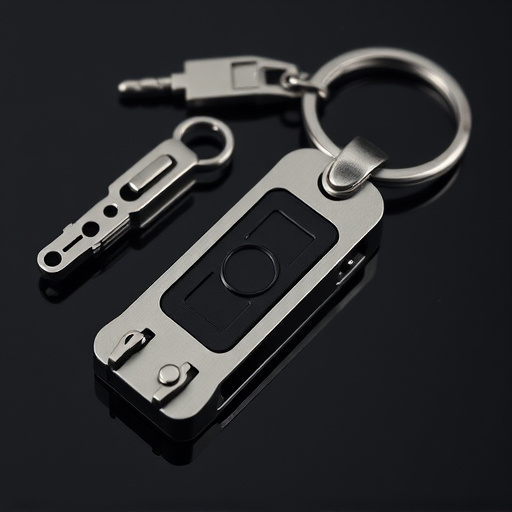Impact-resistant keychains, made from materials like steel or aluminum, pose legal challenges due to their classification as weapons based on intended use. U.S. states have varying restrictions, highlighting the need for a nuanced approach that balances public safety and potential misuse. These keyrings, designed for self-defense, must meet local laws governing non-lethal weapons while prioritizing durability and safety for legal carry in public spaces. Understanding diverse state regulations is crucial for users navigating borders to avoid legal issues while protecting themselves with these compact devices.
In today’s world, personal safety is paramount. One innovative solution gaining traction is the impact-resistant keychain weapon—a discrete self-defense tool legal in many states. This comprehensive guide explores the legal landscape surrounding these devices, delving into key materials used to ensure safety and effectiveness while navigating state-by-state regulations. From understanding the potential impact to exploring liberal carry laws and cross-border considerations, this article equips you with knowledge on protective keychain devices and their legal implications.
- Understanding Impact Resistant Keychain Weapons: A Legal Perspective
- Materials Used in Protective Keyring Devices: What's Legal and Safe?
- States with Liberal Laws for Self-Defense Keychains: A Comprehensive Guide
- Navigating Legalities: Carrying an Impact Resistant Keychain Across State Lines
Understanding Impact Resistant Keychain Weapons: A Legal Perspective
Impact resistant keychain weapons, often crafted from robust materials like steel or aluminum, present a unique legal conundrum in various states. The primary concern revolves around defining and classifying these devices as “weapons” under existing firearms laws. Materials play a pivotal role; for instance, a sturdy metal keyring with a sharp edge could be considered a weapon if it’s designed for combat or self-defense purposes. This interpretation is crucial for determining legality in carry states, where citizens may seek to legally transport such devices.
States have been grappling with regulating these tools, leading to varying levels of restriction and permissiveness. The legal perspective demands a nuanced approach, balancing personal safety and security against potential risks of misuse. Understanding the impact resistant materials and their intended use is essential for both law enforcement and citizens aiming to comply with local regulations regarding legal carry.
Materials Used in Protective Keyring Devices: What's Legal and Safe?
Protective keyring devices, often designed as impact-resistant keychains, are becoming increasingly popular for personal safety. The materials used in these devices play a crucial role in ensuring their effectiveness and legality. In terms of impact resistance, many high-quality keyrings utilize advanced materials like steel, aluminum, or even specialized polymers. These materials provide robust protection against sudden impacts, making them ideal for self-defense purposes while adhering to legal requirements.
When it comes to what’s considered safe and legal, the focus should be on materials that don’t pose any harm to users or bystanders. Avoid materials that could fragment upon impact, such as certain types of glass or brittle plastics. Instead, opt for durable yet non-lethal options that meet the criteria for legal carry in your state. Remember, the key is to find a balance between effectiveness and safety while ensuring compliance with local laws governing self-defense weapons, especially when carrying a protective keyring device in public spaces.
States with Liberal Laws for Self-Defense Keychains: A Comprehensive Guide
In the United States, certain states have more liberal laws regarding self-defense keychains—a handy tool that combines functionality with safety. These states recognize the potential for such devices to deter crime and protect individuals in various situations, especially during unexpected encounters. As a result, they’ve enacted legislation that allows for legal carry, promoting personal security without stringent restrictions.
States with more permissive laws often enable citizens to own and carry impact-resistant keychain weapons, crafted from high-quality materials known for their durability and sharpness. This accessibility empowers individuals to take proactive measures for self-defense, providing a sense of reassurance when venturing into unfamiliar territories or navigating through crowded urban areas. Such legislation reflects a broader societal shift towards empowering citizens with practical tools to safeguard themselves while adhering to legal guidelines.
Navigating Legalities: Carrying an Impact Resistant Keychain Across State Lines
Navigating Legalities: Carrying an Impact Resistant Keychain Across State Lines
When considering carrying an impact-resistant keychain designed for self-defense, understanding state laws is paramount. These compact devices, often containing materials that can serve as weapons, are subject to varying regulations across different jurisdictions. What may be legal in one state could be prohibited or restricted in another, making it crucial to research before traveling or relocating.
State laws regarding such items typically focus on their definition as potential weapons and the specific circumstances under which they can be carried. Some states allow open carry with minimal restrictions, while others demand a concealed carry permit. Furthermore, the materials used in the keychain’s construction—such as ball bearings, pepper spray, or sharp blades—can significantly impact its legality. Always verify local regulations to ensure compliance and avoid potential legal repercussions.
The legal landscape surrounding impact-resistant keychain weapons varies significantly across states, making it crucial for individuals considering legal carry to understand these differences. This article has explored the materials used in such devices, highlighting safety and legality concerns, while providing a comprehensive guide to states with liberal self-defense laws. When navigating the legalities of carrying an impact-resistant keychain across state lines, staying informed and adhering to local regulations are paramount. Understanding the appropriate use and potential implications ensures these tools remain effective for personal safety without crossing legal boundaries.
